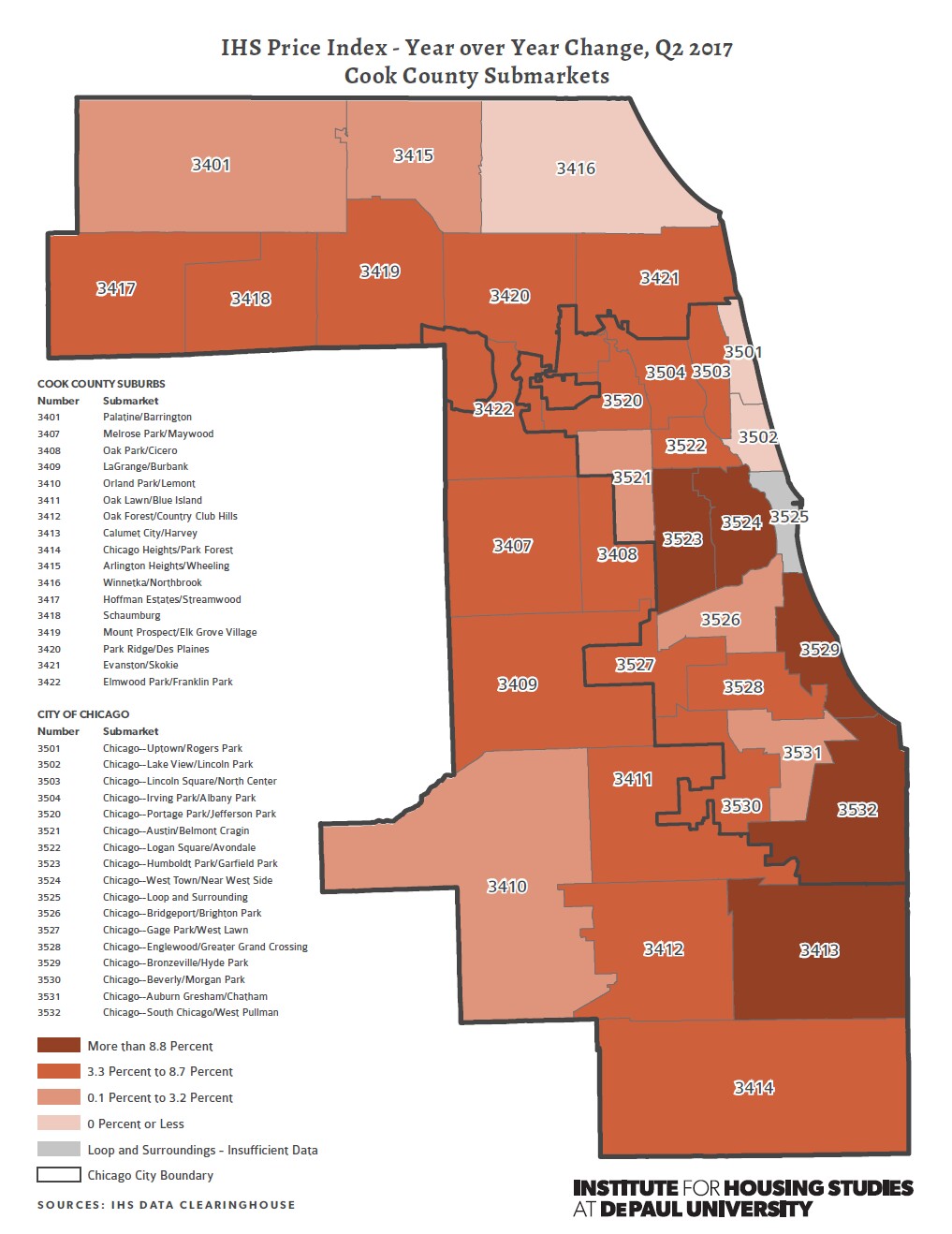There are probably as many ways to define a hot Chicago neighborhood as there are real estate metrics but it seems to me that the most important one is home prices. That’s why I think you’ll find the Depaul Institute For Housing Studies’ 2Q 2017 release of their home price analysis for Chicago and suburban Cook County really fascinating. They break the area up into 33 submarkets (typically a combination of 2 or more community areas or towns) and present the corresponding price trend data succinctly, comprehensively, and with awesome interactive visualization tools. Not to mention that they have an extremely robust methodology (more on that later). Unfortunately, they didn’t have enough data for the Near North Side, Loop, and the Near South Side, which I totally don’t get.
They’ve been producing this report for quite some time but it’s been a while since I checked in on it and now I’m really impressed with their work. As you probably know by now I’m a data kind of guy and I’m really drooling over what they’ve put together. You really need to check out their original report, linked above, but I’ll provide some of their key analyses here and a few interesting conclusions from the data.
For starters, they mapped the year over year price changes by submarket. You’ll want to click on the image below and then click on that image to blow it up to its full size so you can read the names of the submarkets.

They also produced this interactive graph (larger version on their site) of the historical home price trends that allows you to select individual neighborhoods and check the price at various points in time.
Then they have a sortable table on their site that shows home price changes over different time periods by neighborhood and they also make their raw data available. Looking at the data you realize that, even by restricting yourself to just home prices, there are multiple ways to define the hottest Chicago area neighborhoods depending upon what time period you consider. For instance:
- Humboldt Park/ Garfield Park and Bronzeville/ Hyde Park had the largest price gains in the last year – 12.4% and 12.2% respectively. West Town/ Near West Side came in third with a 10.4% increase.
- Humboldt Park/ Garfield Park and Logan Square/ Avondale had the biggest improvements since the bottom of the market – 102.2% and 74.6% respectively.
- West Town/ Near West Side and Logan Square/ Avondale had the largest gains relative to the bubble peak – but only 14.7% and 11.8% respectively.
- Only two other areas are above their bubble peak – Lincoln Square/ North Center (6.6%) and Lake View/ Lincoln Park (1%). 29 areas have not yet matched their bubble peak. But keep in mind that the whole downtown area was excluded from their analysis.
So what you consider the hottest Chicago neighborhoods totally depends upon how you measure it.
BTW, there’s another interesting observation from the data. A few Chicago neighborhoods actually saw price declines in the last year. Lake View/ Lincoln Park declined by 2.4% and Uptown/ Rogers Park declined by 1.1%. We knew that sales were getting tougher in Lake View and Lincoln Park but didn’t really think that prices could decline there but this data now puts a lot of things in a much clearer perspective. Nevertheless, as I pointed out above, these two neighborhoods are still above their bubble peak – barely.
Depaul IHS’ Methodology For Determining Chicago Home Price Trends By Area
The Depaul Institute For Housting Studies’ methodology for tracking these prices is extremely robust. They don’t rely on the incredibly simplistic and flawed median or average home prices that are corrupted by changes in the mix of housing sold. Nor do they attempt to match sales of specific properties to the previous sale. Instead they use what they call a hedonic price index model that adjusts property sales data for the attributes of the properties sold. That way they can factor out changes in the quality and types of housing over time.
#ChicagoHomePrices
Gary Lucido is the President of Lucid Realty, the Chicago area’s full service discount real estate brokerage. If you want to keep up to date on the Chicago real estate market, get an insider’s view of the seamy underbelly of the real estate industry, or you just think he’s the next Kurt Vonnegut you can Subscribe to Getting Real by Email using the form below. Please be sure to verify your email address when you receive the verification notice.